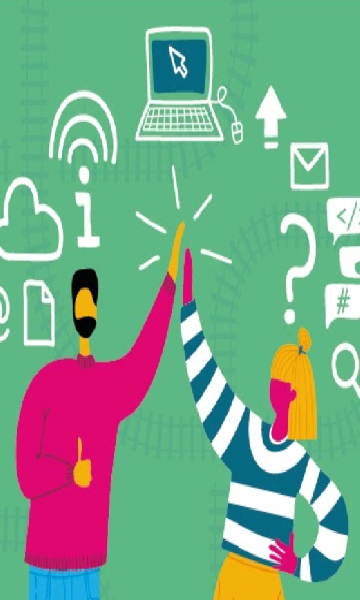4 out of 10 Belgians run a real risk of being digitally excluded. An awful situation, for themselves, but also for society. The Literacy Week aims to do something about this, and draws attention to several initiatives concerning the acquisition of digital skills on its website ikbenmee.be.
For example, there is the Centre for Basic Education (CBE) where everyone can learn basic skills such as language, mathematics, social orientation and working with a computer. This is in a very concrete, immediately usable way: at home, at work, at a training course, etc. Interested parties can take the open offer, but the CBE also collaborates with other organisations and companies.
Several associations and official institutions in the Brussels-Capital Region are also organising courses to reduce this illiteracy.
More information at:
www.basiseducatie.be &
https://be.brussels/education-and-training/continuing-education/literacy (NL) or
https://www.lire-et-ecrire.be/bruxelles?lang=fr &
https://be.brussels/enseignement-formation/formation-continue/alphabetisation (FR)
But sometimes someone already has those basic skills and the challenge lies elsewhere. In that case, it may be useful to take a secondary education course so that a secondary school diploma can be obtained. Alternatively, specific vocational training can be followed, learning Dutch as a second language or another language. After all, this can also be a step towards acquiring digital skills.
More information at:
https://onderwijs.vlaanderen.be/nl/cursisten (NL) ,
https://www.vocvo.be/en &
www.vdab.be/english (EN) and
http://www.enseignement.be &
www.bruxellesformation.brussels (FR)
Many people also find a training course and/or activity that could help them develop or increase their digital skills in their spare time through the wide range of socio-cultural training work. Competencies and talents are taught and further developed through workshops, debates and meetings in which daily life challenges are the starting point.
More information at:
www.vormingplus.be &
https://www.citizenne.be/ (NL) and
http://www.enseignement.be &
http://www.caban.be/?lang=fr (FR)
Last but not least, there are those organisations that focus very specifically on directing the digital self and organise training courses, workshops, etc., on learning to use and understand digital technology and media.
More information at:
https://mediawijs.be/ (NL) and
https://wetechcare.org/ (FR)
This list of valuable, accessible and high-quality initiatives will allow anyone to get started with sharpening up their digital skills. After all, everyone deserves to be able to keep up with the digital and technological evolution. As a result of the coronavirus crisis, all of this has become, by necessity, more and more urgent: more and more things are going digital: work, our social life, public services, etc.
The Brussels government is also aware of the importance of digital inclusion and has approved a paper to this end. This paper provides for a 2018-2022 Digital Inclusion Action Plan with the following objectives:
- taking effective and measurable measures to combat digital exclusion;
- establishing consultation between the players active in the field of digital inclusion;
- better communication around these issues and existing resources to the general public and the target group.
This action plan is based on four pillars: the region as a central player, the municipalities, PCRs and communication. It also provided for the appointment of a digital inclusion co-ordinator for the Brussels-Capital Region, within the BRIC. More information about the action plan can be found at:
https://smartcity.brussels/digital-inclusion. You can contact the co-ordinator at inclusion@cirb.brussels
Digital skills are required of everyone today and the solution is within reach!
